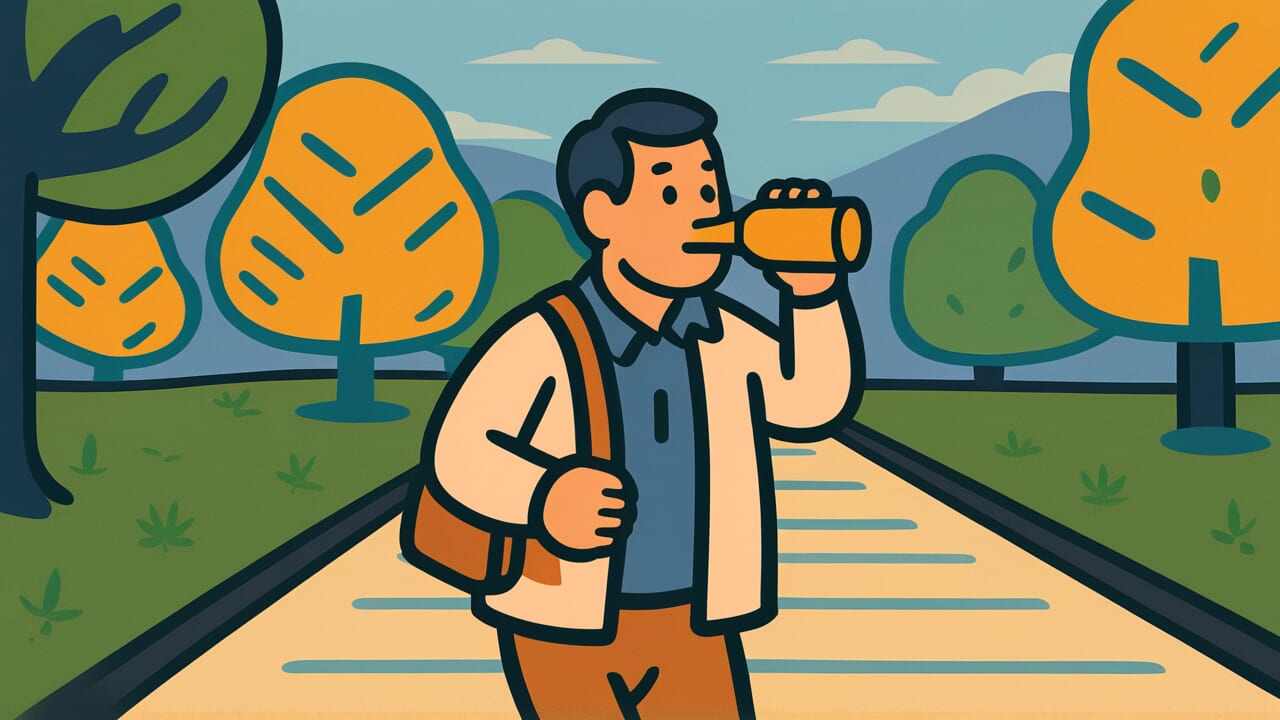How to Read “The drinker drinks and passes through”
nomu mono wa nonde tōru
Meaning of “The drinker drinks and passes through”
“The drinker drinks and passes through” means that people who love alcohol will find a way to drink, even when they have no money. They somehow manage to get what they need and end up drinking anyway.
This proverb isn’t just about alcohol, though. It describes a basic human trait: when people truly love something, they’ll find ways to keep doing it no matter what. They overcome obstacles to pursue their passions.
People use this saying when they see someone overcoming difficulties for something they love. It also works when expressing your own strong attachment to something.
The proverb recognizes that true passion finds a way past all barriers. No money, no time, opposition from others—none of these stop someone who really wants something.
Today, this expression applies to far more than drinking. It fits hobbies, lessons, favorite foods, and any passion. People use it to express amazement or resignation at how strong human attachment can be.
It acknowledges something very human: our attachment to what we love can’t be explained by logic alone.
Origin and Etymology
The exact origin of this proverb isn’t clearly documented in historical texts. However, the structure of the phrase offers interesting insights.
“The drinker drinks and passes through” likely emerged from common culture during the Edo period. Back then, alcohol was one of the few entertainments available to ordinary people.
Daily life wasn’t easy, though. Many people lacked the money to drink regularly.
The interesting part is how the verb “passes through” is used. “Tōru” literally means “to pass along a path.” Here it means “to manage somehow” or “to accomplish despite obstacles.”
In other words, even without money, people find ways to drink. The phrase captures this with “passes through.”
Behind this expression lies keen observation of human desire and attachment. People recognized a universal truth: passion for something makes people overcome obstacles.
Using alcohol as a concrete example, the proverb actually expresses a truth about all human behavior. This universal quality likely helped it spread among common people.
Usage Examples
- He bought another new camera apparently. “The drinker drinks and passes through” really says it well.
- I pre-ordered my favorite idol’s merchandise even though it’s before payday. That’s “the drinker drinks and passes through” for you.
Universal Wisdom
“The drinker drinks and passes through” reveals a truth about human nature. When faced with strong desire or passion, reason and planning often become powerless. This proverb shows deep insight into what makes us human.
We make plans every day. We set budgets. We try to live rationally.
But when we encounter something we truly love or deeply want, rational judgment crumbles easily. Why does this happen?
Because reason alone doesn’t drive human behavior. Emotion and desire are powerful forces too.
This proverb has been passed down for generations because everyone recognizes this trait in themselves. We drink when we have no money. We buy things we can’t afford. We do things we shouldn’t.
We blame ourselves, yet somewhere inside we think “it can’t be helped.” This saying doesn’t condemn human weakness. Instead, it accepts it with warmth.
Our ancestors understood something important. Humans aren’t perfectly rational beings. We’re driven by passion and desire.
And that imperfection is what makes us human. It’s also the source of our vitality for living.
When AI Hears This
This proverb describes a system that has lost self-control. Normally, healthy systems have negative feedback that says “stop when you go too far.”
For example, when body temperature rises, you sweat to cool down. When your stomach fills, appetite disappears. These are control mechanisms.
But in “the drinker drinks and passes through” state, this stopping device completely fails.
What’s interesting is the structure where the action itself fuels the next action. Take drinking as an example. Alcohol paralyzes the brain’s inhibition system, eliminating judgment about “one more drink.”
The more you drink, the higher the probability you’ll keep drinking. This is exponential growth in mathematical terms. One becomes two, two becomes four, four becomes eight—accelerating.
In systems engineering, when such self-reinforcing loops pass a critical point, they enter “runaway mode.” Only external forced shutdown can stop them.
Even more notable is this system’s blindness. The person involved cannot recognize they’re in an uncontrolled state. Why? Because the part of the brain that makes judgments is itself impaired by this loop.
Organizational rigidity follows the same structure. The “intoxication” of past success steals judgment, causing repetition of the same methods until collapse.
This proverb captures with surprising accuracy the inevitable outcome when feedback is absent.
Lessons for Today
This proverb teaches modern people how to discover their true values. We think in our heads “this is important” or “I should prioritize that.” But our actual behavior tells a different story.
We say we have no time, yet we scroll through social media. We say we have no money, yet we buy what we like. That behavior reveals your true priorities.
This isn’t a lesson for blaming yourself. Rather, it’s a hint for recognizing your genuine feelings.
If you’re struggling because you “can’t continue” something, maybe you don’t truly love it. Conversely, if you keep doing something despite difficulties, that’s what truly matters to you.
Modern society overflows with voices saying “you should be this way.” But like “the drinker drinks and passes through,” people ultimately choose what they truly love.
So listen to the truth your actions reveal, not society’s expectations. That’s where you’ll find hints for living a life true to yourself.



Comments